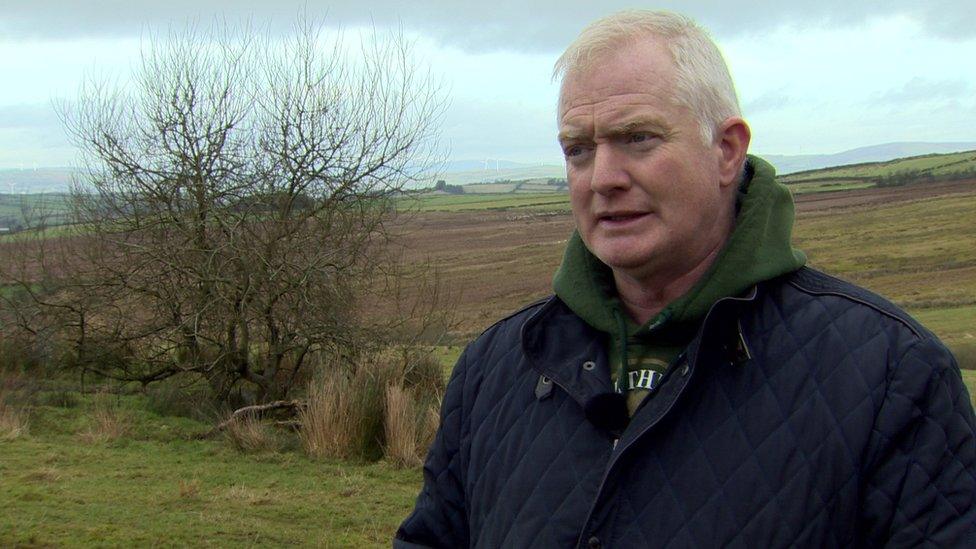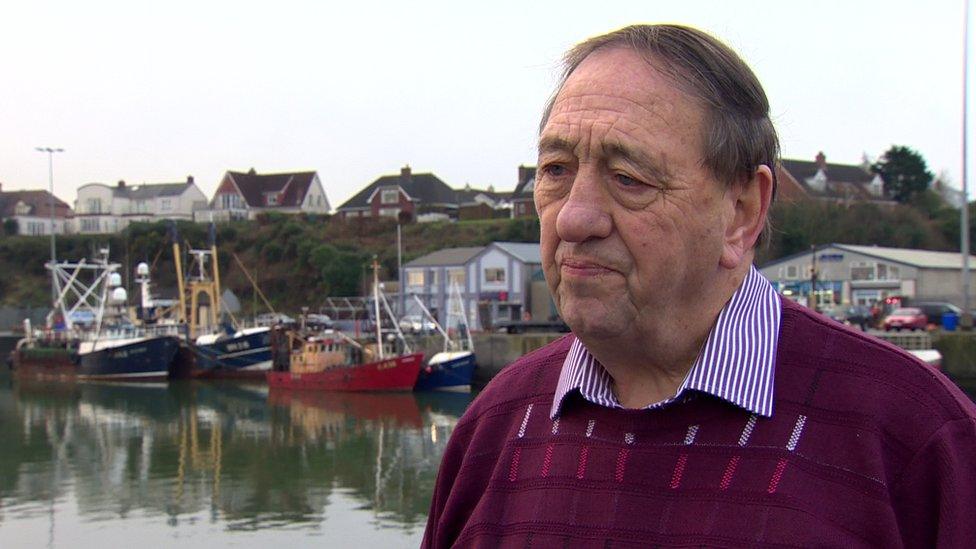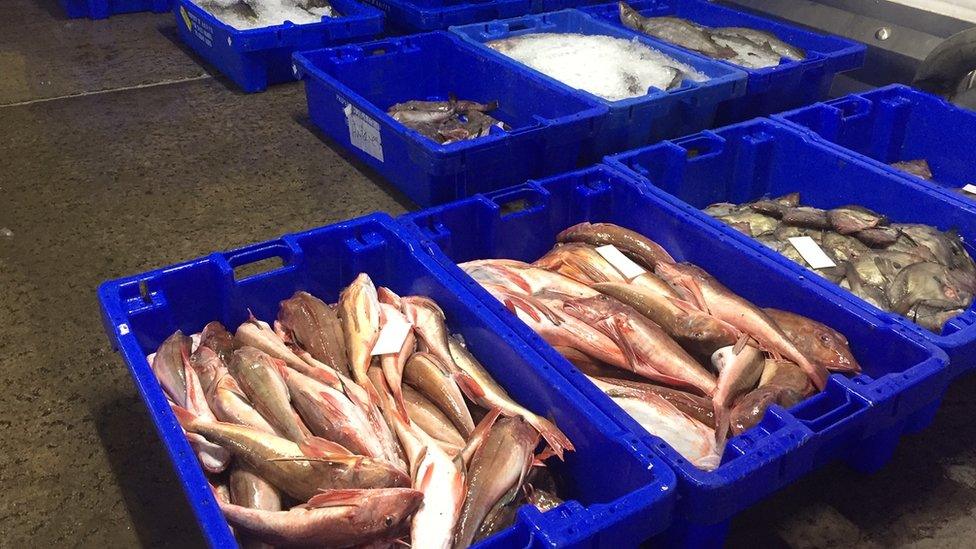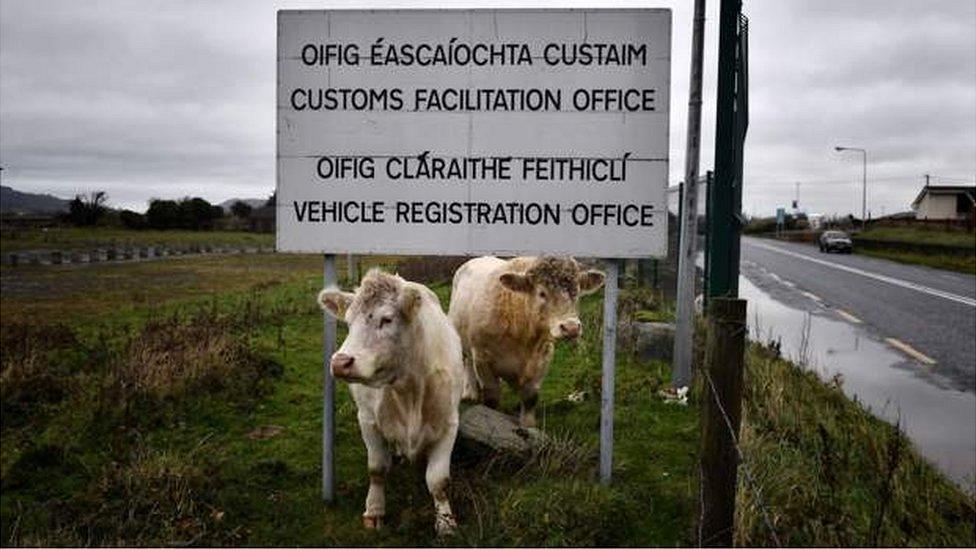Brexit: What next for farming as the UK exits the EU?
- Published

Hugh Devine works on his farm in the Sperrin mountains
Hugh Devine is about to get very busy. A month from now it will be long days and sleepless nights as he helps lamb 1,200 ewes on his hill farm at Glenmornan near Artigarvan.
Farmers will be the first to experience the reality of Brexit.
From 23:00 GMT on 31 January, they are out of the Common Agriculture Policy (CAP), the financial support mechanism Hugh has known all his farming life.
Hugh did not vote for change but now he has to embrace it.
Replacing the CAP
For Hugh, his sons and grandson, what is important is that what replaces CAP continues to provide an income that supports farming in places like the Sperrin Mountains
In the short term, there is a guarantee of the status quo and the same amount of money.
But it is what Northern Ireland decides to do long-term that is of interest to Hugh and others like him.
The structure of the current subsidy system means that hill farmers only get 70% of the payment level available to lowland farmers.
There was a plan to level the payments out and on the strength of that, extra money for hill farmers was cut.
But Brexit stalled that equalisation process and now Hugh worries that it may not restart.
'Them and us' scenario
He says he wants a future support mechanism to be fair for both those who farm the hills and those whose land is in lowland areas.
And he doesn't want to see farmer pitted against farmer in a "them and us" scenario.
As Friday's Brexit deadline looms, a farmer expresses concern about life outside the EU
The hill farm and the lowland farm complement each other he says, the former producing lambs and calves that are finished by the latter.
The agriculture minister has talked about focusing financial support on what he terms "productive farms".
But Edwin Poots is conscious of the concerns of hill farmers and is promising extra income streams that will keep them farming beef and sheep in the hills.
Hugh says his farm is productive, he hopes to get 1,800 lambs from his 1,200 ewes this spring, but the long winters and boggy ground make it an expensive place to farm and it is harder to turn a profit.
He remains convinced that farming has a future for his family.
"Farming will still be going in 50 or 100 years, maybe in a different way. There'll be changes, but it's in our DNA."
'I was on the winning side that time'
When it comes to fishing, Leslie Girvan also believes there will be changes, and he thinks they'll be changes that will benefit coastal communities.
Now retired, he gave 60 years to the fishing industry, having gone to sea in 1959.

Leslie Girvan, now retired, had been on the seas since 1959
He reflects on the upcoming battle over fisheries with some experience. He's a veteran of the Cod Wars of the 1970s when Iceland and the UK crossed swords in a bitter dispute over access to fishing grounds.
"I was on the winning side that time," says Leslie. "I was on an Icelandic boat."
Leslie believes joining the Common Fisheries Policy led to the "decimation" of the UK fishing fleet. Other countries handed out grants to their fleets upgrade their boats, and he says, the UK fleet got money to decommission theirs.
Access to UK waters for EU boats meant more vessels chasing the stocks of fish, quotas were the control mechanism and that meant fewer fishing opportunities.
There used to be 40 white fish boats in Kilkeel, he says, now there are just four.

The number of white fish boats in Kilkeel has reduced 10 fold
He believes a good fishing deal can breathe new life into the harbour towns along the County Down coast.
He accepts there will probably be a deal involving access to waters and access to markets, but says it would be hard to get a worse one than what they have at the moment.
The EU has already stated its case, suggesting a tie up between fisheries - which is of huge interest to several of the EU27 - and financial services which is of crucial importance to the UK economy.
A fisheries deal is the first big obstacle in the UK/EU talks on a free trade agreement.
It's meant to be done by 1 July, so that it can be used as the basis for annual quota negotiations later in the year which the UK will participate in as an independent coastal state, for the first time in almost half a century.
Like Hugh Devine, Leslie Girvan believes in a future for fishing, but when it comes to the deal, he says "time is very short and someone has to give".
- Published1 January 2020
